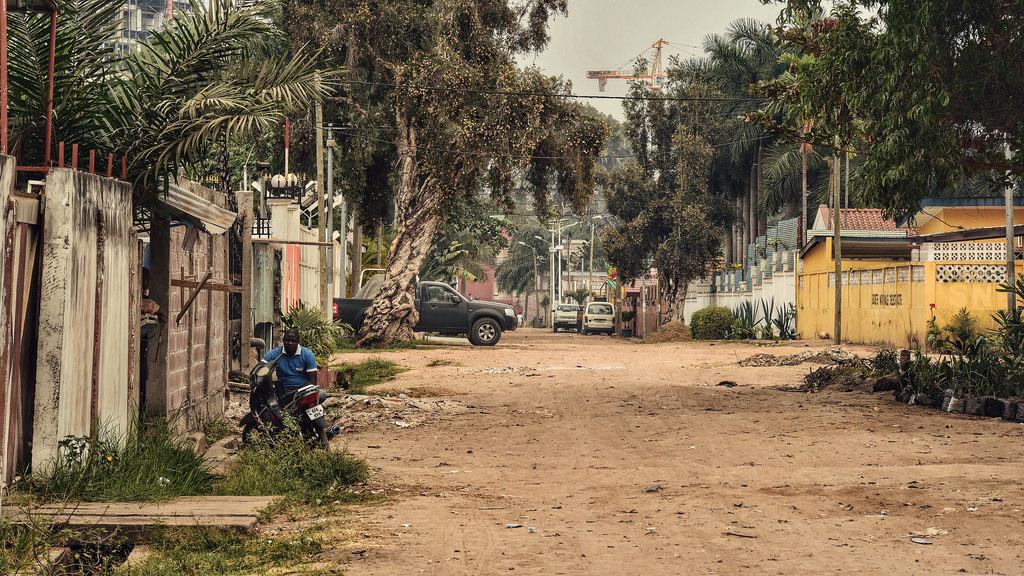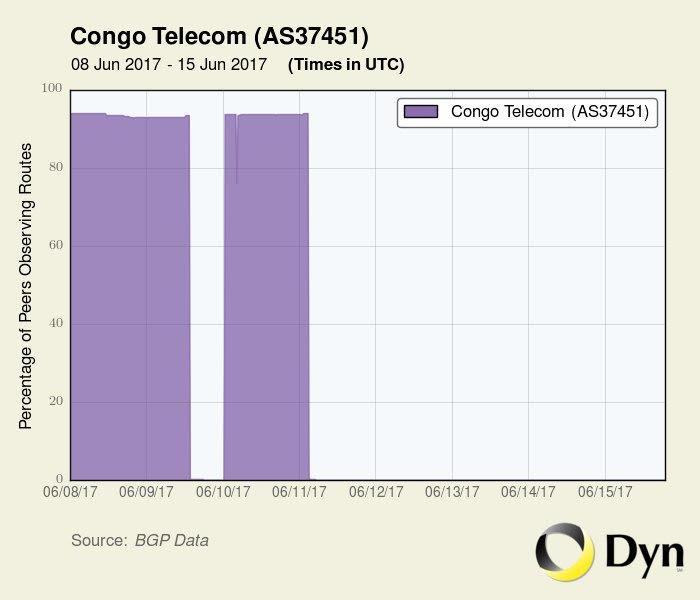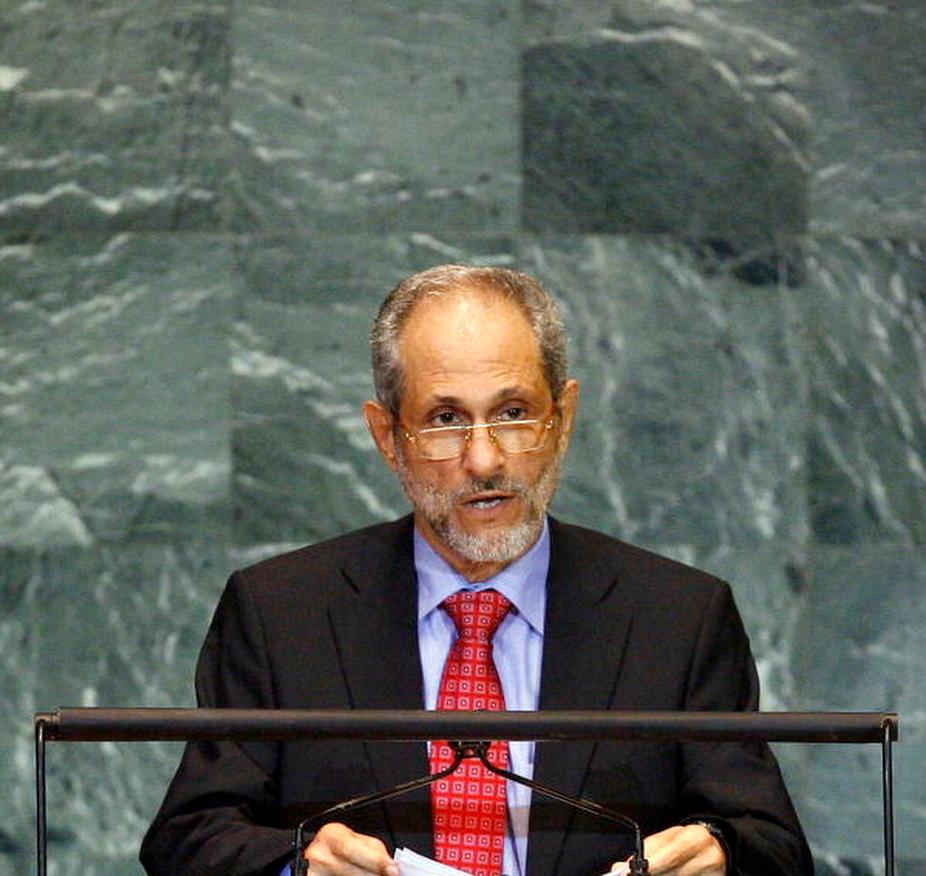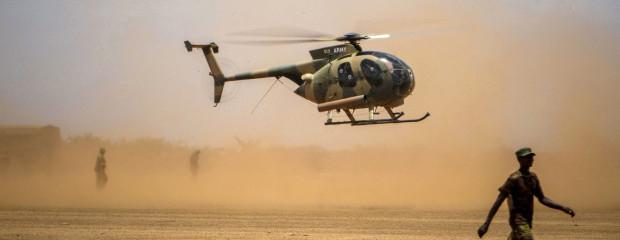Something is happening in Congo-Brazzaville

Amid opposition protests and a month before legislative elections, the internet has gone down, leading to an information blackout.

There were protests in Brazzaville in the days running up to the internet going down. Credit: Oscar W. Rasson.
On 11 June, citizens in the Republic of Congo lost access to the internet. President Denis Sassou Nguesso, in power for all but five years since 1979, blamed “technical difficulties”. A fishing vessel off the coast of Pointe-Noire, his spokesman claimed, snapped a fibre optic cable, separating Congo from the West Africa Cable System (WACS). Repairs will take anywhere between two and seven weeks.
Although the official explanation has been repeated by MTN Congo, the country’s largest provider, and several Sassou Nguesso-sponsored media outlets, the government has offered no evidence to corroborate the account. It is unclear which “fishing vessel” caused the break, who operated it, or precisely where it occurred.
Citizens doubt the government’s explanation, and not simply because of the wave of recent internet shutdowns across Central Africa. Rather, the blackout comes at a time when the crisis that’s engulfed the country since the October 2015 constitutional referendum is intensifying. And with legislative elections scheduled for 16 July, opposition leaders are again moving to harness citizen frustrations and force democratic change.

Roots of the unrest
The current unrest in Congo-Brazzaville has three sources.
First, citizens were widely opposed to the 2015 constitutional referendum, which removed presidential term limits and enabled Sassou Nguesso to compete in – and ultimately win – the presidential elections in March 2016.
This “constitutional coup” elicited a series of mass protests, which the regime sought to stem by arresting key opposition leaders. His two chief opponents in the presidential elections are now in prison: General Jean-Marie Michel Mokoko, who, as military chief-of-staff, provided security for the 1991 National Conference that paved the way for the 1992 democratic elections; and André Okombi Salissa, a minister in every Sassou Nguesso government between 1997 and 2012.
The president has also incarcerated civil society leaders and journalists, including Ghys Fortuné Dombé Bemba, Paulin Makaya, Marcel Pika, and Modeste Boukadia, all of whom remain in prison.
Second, citizens are outraged by the ongoing violence in the Pool region, which surrounds the capital Brazzaville. By launching a military assault on the area – which is largely populated by ethnic Lari, long opposed to the government – Sassou Nguesso has sought to discourage citizens in Brazzaville from contesting his hold on power.
For international cover when first attacking the region in April 2016, Sassou Nguesso claimed to be fighting the “terrorist” Pastor Ntoumi, a former militia leader based in Tsoumouna, Pool. But the accusation was absurd; Ntoumi disbanded his militia in 2006. Opposition leader Claudine Munari denounced the assault as “genocide” against ethnic Lari.
[Republic of Congo government blames non-existent militia for attack, wages war on citizens]
However, while Ntoumi had no militia when operations began, he has since acquired supporters and weapons. He has captured weapons from police and military outposts, received supplies from disgruntled quarters of the military, and amassed a small group of ethnic Lari young men, who have little choice but to fight back.
In April 2017, Ntoumi launched an assault against the military that left 18 soldiers dead. In May, Ntoumi’s militia advanced to Madibou, near the Djoué bridge, just 14 miles from Brazzaville. Sassou Nguesso was forced to acknowledge Ntoumi’s new strength. On 3 June, the presidential spokesman claimed that Ntoumi would not breach Brazzaville, an announcement that signalled to citizens that he in fact might.
These two political crises have been exacerbated by a third factor: the economic crisis currently sweeping across Central Africa. As global oil prices have declined, Sassou Nguesso has reverted to the oil-backed loans that he used throughout the 1980s. He did not, however, curtail spending, and so the oil price decline has created a financial crisis.
In March 2017, just six years after Congo-Brazzaville received debt relief from the IMF and World Bank, the government’s debt/GDP ratio reached 77%, exceeding the 70% limit imposed by Central African Economic and Monetary Community (CEMAC). According to one industry executive, the regime has committed roughly four years of future oil revenue and is now technically in default to Glencore and Trafigura.
This financial crisis, in turn, has caused a fuel crisis in Brazzaville and Pointe-Noire. The state-owned oil refinery satisfies only 20% of the country’s domestic demand for fuel. This means the rest must be imported, but this is an activity over which the state-owned oil company, Société Nationale des Pétrôles du Congo (SNPC), enjoys a monopoly. The SNPC has long been dominated by Sassou Nguesso’s son, Denis Christel, so the monopoly on fuel imports effectively belongs to the president himself.
Since the SNPC is bankrupt, it is unable to purchase enough fuel on the international market to satisfy domestic demand. But rather than abandon the monopoly – and hence forgo future profits – Sassou Nguesso has chosen to subject his citizens to a fuel shortage. For cover, the government blamed “technical difficulties” at Congo’s oil refinery.
As prices rise, opposition leader Charles Bowao observed, “citizens can no longer feed their families”.
Escaping the crisis
It is unclear precisely how Sassou Nguesso will escape the current crisis. In the long-term, the Moho Nord oil field will likely provide some relief. Inaugurated in May 2017, Moho Nord will produce 100,000 barrels per day by late-2018, increasing Congo’s total production to roughly 300,000 barrels per day.
But in the meantime, the regime is seeking relief elsewhere. After a March 2016 visit, the IMF appears poised to provide financial support, a move that stunned some citizens. The #SassouFit Collective, a civil society organisation, launched a social media campaign asking the IMF to reconsider. The campaign was entitled “Don’t Save the Tyrant”.
In May 2017, the regime began working with an Abu Dhabi investment firm to float a $4 billion Eurobond, equivalent to roughly half of Congo’s annual GDP. If the scheme is successful, the country’s debt/GDP ratio will approach 125%. On the eve of debt relief in 2010, the government’s debt/GDP ratio was 90%.
The proposed Eurobond has not been disclosed to citizens.
Opposition protest
Given Sassou Nguesso’s willingness to employ violence against citizens, anti-government protests are extraordinarily risky. These risks, however, are mitigated by crowds. Accordingly, the opposition scheduled a series of events to coincide with the National Day of Reconciliation, held each year on 10 June.
On 8 June, the opposition held a memorial ceremony for the victims of the military assault on Pool. In response, security forces arrested several participants and encircled the homes of opposition leaders.
On 10 June, the opposition called on citizens to “wear a sign of mourning”. Brazzaville was placed on “lockdown”, according to one opposition leader who is also a former government minister. The internet shutdown began the next day.
This blackout not only coincided with opposition protests. It also immediately followed an announcement by Congo’s embassy in Paris that it would issue no visas “until further notice”. The government again blamed “technical difficulties”. But many believe the move is intended to block foreign coverage of opposition protests and the upcoming legislative elections.
Legislative elections
The government’s timeline for getting the internet back up – between two and seven weeks – means that the shutdown may well persist through legislative elections scheduled for 16 July. These elections will be neither free nor fair.
On 26 May, the primary opposition coalition, FROCAD-IDC, announced an electoral boycott. “No elections,” they declared, “until the end of the war in Pool [and] the liberation of all political prisoners”. On 18 June, Mathias Dzon, another former presidential candidate and Sassou Nguesso minister, called the exercise an “electoral farce”.
In the elections, eleven of Sassou Nguesso’s relatives will compete, more than ever before. If they win – as they almost certainly will – then the president’s relatives will constitute more than 7% of the National Assembly’s 153 deputies. This would mean that, as a voting bloc, the family will likely be larger than any political party apart from Sassou Nguesso’s own Congolese Labour Party (PCT).
Another prominent candidate running as a Sassou Nguesso ally is Joachim Mbanza, editor-in-chief of La Semaine Africaine. This is Congo’s oldest newspaper and, for much of its history, was the country’s leading independent media outlet. Mbanza’s candidacy makes explicit what citizens have long believed: La Semaine Africaine is now part of the regime’s propaganda apparatus.
The current crisis is strikingly similar to the one that culminated in the National Conference of 1991 and Sassou Nguesso’s electoral humiliation of 1992 in which he came third. The president knows this, as does the opposition.
Although the internet shutdown ensures we are unlikely to hear much about it over the coming weeks, Congo-Brazzaville’s crisis is unlikely to subside soon.





